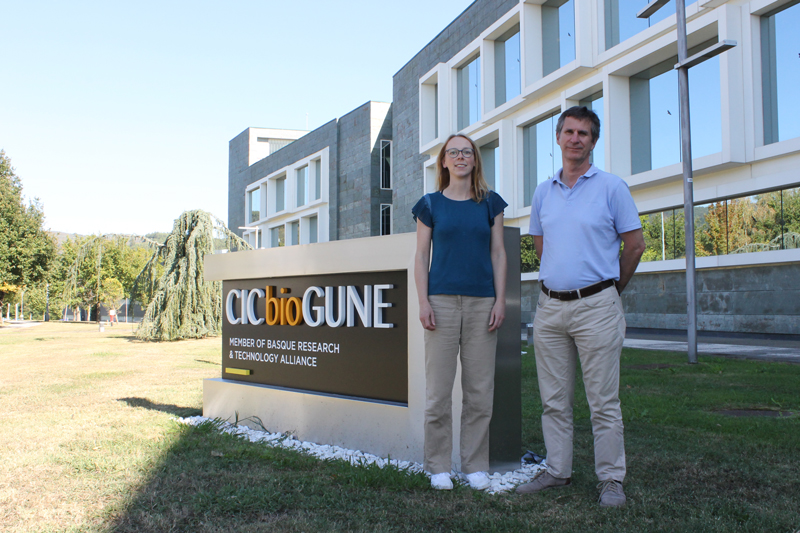
2022/10/03
The U.S. Alzheimer Association funds CIC bioGUNE research aimed at identifying a new approach for early diagnosis of the disease
The study, which will run for the next three years, advances the hypothesis that the metabolome of central nervous system-derived exosomes could be a highly valuable tool for discovering new biomarkers of Alzheimer’s disease.
The research will also investigate the role of exosomes in the spread of the disease.
The U.S. Alzheimer’s Association is to fund research by CIC bioGUNE over the next three years to identify a new approach to early diagnosis of this neurodegenerative disease. The project, accepted within the framework of the Association’s international research grants programme, is rooted in the hypothesis that the metabolome of central nervous system-derived exosomes could be a highly valuable tool for discovering new biomarkers of this pathology and understanding the metabolic changes underlying the disease.
Juan M. Falcón-Pérez, Ikerbasque researcher in the Exosomes Laboratory at CIC bioGUNE and principal investigator of the project, explains: “We believe that this research may identify a new way to diagnose Alzheimer’s disease at an early stage. Furthermore, the project contributes to understanding the progression of the disease, which may generate new potential opportunities to develop therapies”.
“Biomarkers for Alzheimer’s disease are in high demand, as they can enable early diagnosis and, where appropriate, follow-up therapy”, Dr. Falcón-Pérez adds. “To identify early, non-invasive biomarkers, we will characterise exosomes from patients using metabolomics methods. Our second objective is to investigate the role of exosomes in the spread of the disease. Therefore, we will analyse the effect of Alzheimer’s disease exosomes on the metabolome of neurons using an in vitro model”.
The objective of the Alzheimer’s Association grant programme, based in San Diego, USA, is to fund innovative investigators in research areas related to this pathology. The unique combination of CIC bioGUNE expertise in the fields of exosomes and metabolomics opens up a new perspective in the search for biomarkers of Alzheimer’s disease, a factor that has been taken into account when awarding the grant to the project. Until now, research into the discovery of Alzheimer’s disease biomarkers in exosomes has focused mainly on proteomics and transcriptomics methods.
The research will be conducted by Dr. Elisabeth Rackles, co-principal investigator of the project, who has recently obtained a prestigious postdoctoral grant from the Walter Benjamin Programme in Germany, and who holds a postdoctoral research position in the Exosomes Laboratory at CIC bioGUNE.
Connection between exosomes and Alzheimer’s disease
Exosomes are small vesicles that are released by cells and which carry a molecular load that varies according to the biological state of the cell. Therefore, the composition of exosomes is considered a potential source of reliable and non-invasive biomarkers. Recent studies have described a link between the presence in the cell of intermediates of specific metabolic pathways and the development of Alzheimer’s disease. The hypothesis that CIC bioGUNE will work on is that these molecules are also present in the composition of exosomes derived from the central nervous system. Thus, the exosome metabolome could be a tool for understanding the changes that occur in the metabolism of patients with Alzheimer’s, thus discovering new biomarkers of this terrible disease.
About CIC bioGUNE
The Centre for Cooperative Research in Biosciences (CIC bioGUNE), member of the Basque Research & Technology Alliance (BRTA) and located in the Bizkaia Technology Park, is a biomedical research organisation conducting cutting-edge research at the interface between structural, molecular and cell biology, with a particular focus on the study of the molecular bases of disease, for use in the development of new diagnostic methods and advanced therapies.
About Ikerbasque
Ikerbasque - the Basque Foundation for Science - was set up on the initiative of the Basque Government Department of Education to further strengthen its commitment to scientific research by attracting, bringing to the Basque Country and subsequently consolidating excellent researchers from all over the world. Today, Ikerbasque is a consolidated organisation with 290 researchers working in all fields of knowledge.
About the BRTA
The BRTA is an alliance made up of 4 collaborative research centres (CIC bioGUNE, CIC nanoGUNE, CIC biomaGUNE and CIC energiGUNE) and 12 technology centres (Azterlan, Azti, Ceit, Cidetec, Gaiker, Ideko, Ikerlan, Lortek, Neiker, Tecnalia, Tekniker and Vicometch), with the aim of developing advanced technological solutions for Basque companies.
With the support of the Basque Government, the SPRI Group and the Provincial Councils of the three regional provinces, the alliance seeks to promote collaboration among its centres, to strengthen the conditions to generate and transfer knowledge to companies, contributing to their competitiveness, and to spread Basque scientific and technological capacity outside of the Basque Country.
BRTA has a staff of 3,500 professionals, accounts for 22% of the Basque Country’s R&D investment, generates an annual turnover of over EUR 300 million and files 100 European and international patents per year.
See a large version of the first picture





